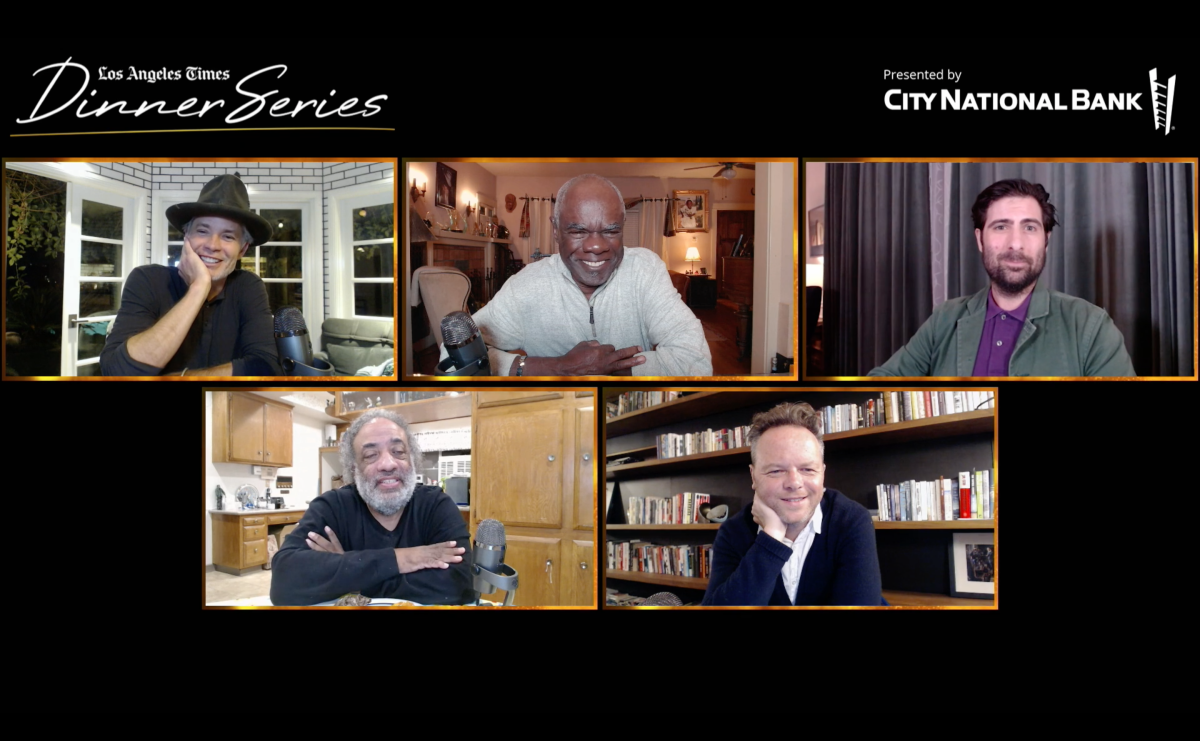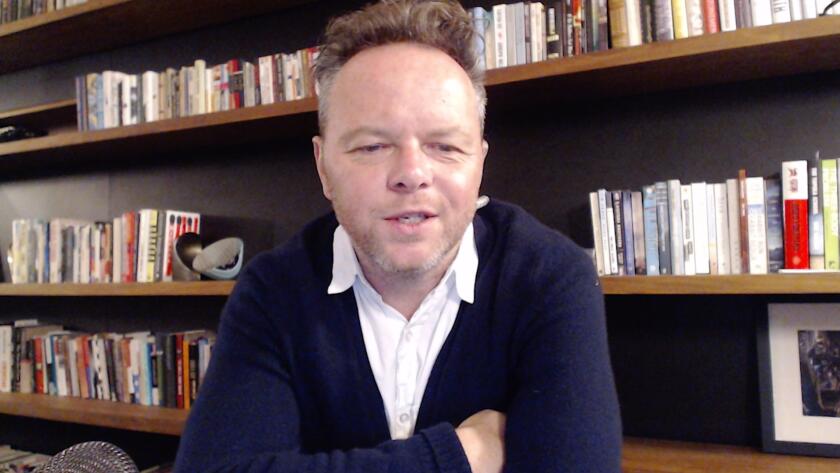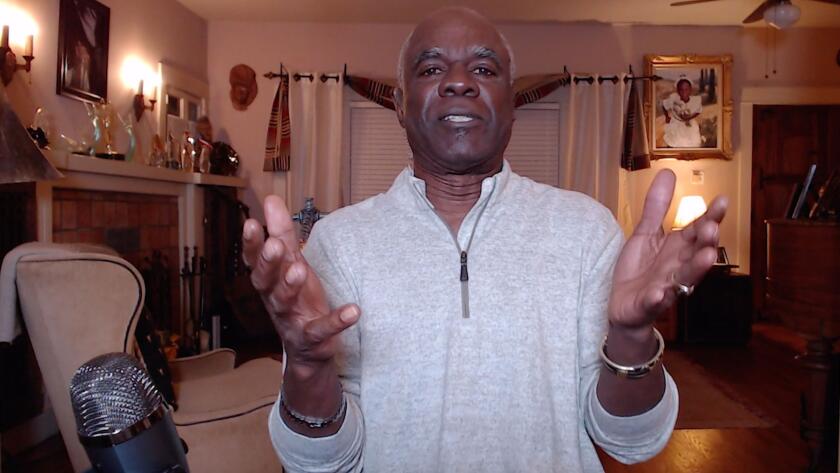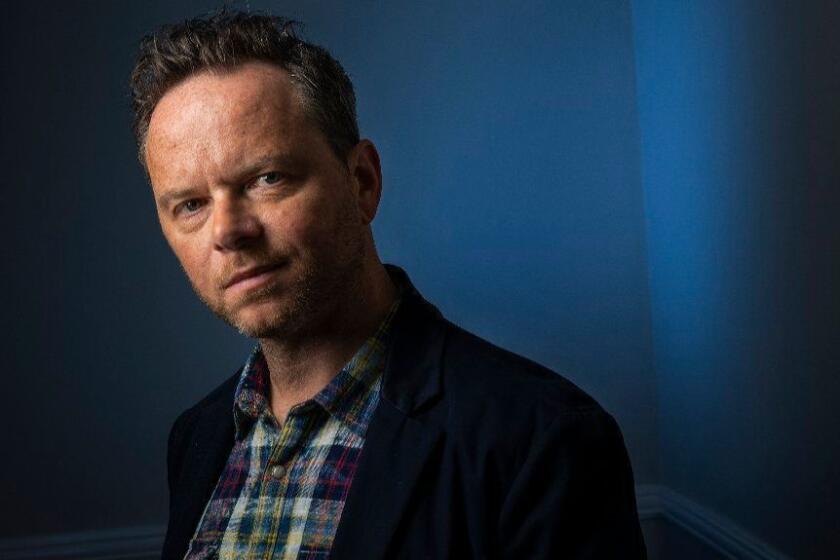America has an ‘unsettling’ love affair with gangsters. ‘Fargo’s’ cast is no different

The latest edition of the Los Angeles Times Dinner Series features a reunion of the creator of the anthology series “Fargo” and three cast members from the fourth installment, currently airing Sundays on FX.
Noah Hawley, who has also written and directed several episodes of the Emmy-winning series, joined Jason Schwartzman, Glynn Turman and Timothy Olyphant to discuss their favorite moments from the season and several other topics with Times staff writer Greg Braxton as they enjoyed a gourmet meal from Birdie G’s.
The dinner for the event, sponsored by City National Bank, included the Santa Monica restaurant’s trademark flatiron steak and noodle kugel topped with pumpkin butter and sage.
The current installment of “Fargo” stars Chris Rock and revolves around a war between Black and Italian crime syndicates in Kansas City, Mo., in 1950.
FX’s anthology series “Fargo” returns for Season 4 after a three-year hiatus, featuring Chris Rock in a story of rival gangs in 1950 Kansas City.
Noah, I wanted you to get into what your inspiration was and why you’re basing this season of ‘Fargo’ on a war between ethnic criminal syndicates.
Noah Hawley: One of the great things for me about being able to take my time is that a number of years go by between when I write one year and make it and when I write another year and make it. And it really allows me to believe that this is the only “Fargo” I’ve ever made, on some level. I get far enough away from the previous year or the years before it that I don’t have to worry about whether it’s similar to something or different from something else. And this year was the story of these two crime families who trade the youngest son of the boss. And once I had that set up in my mind, then the question became, well, who are these people? What year is it? And what happens next? But really it was a way to explore what it means to be an American.
It just seemed like if I wanted to tell a story about America, then I was telling the story about immigration. And if I’m telling a story about immigration, I’m talking about assimilation. At which point, what better way to talk about assimilation than being a child trying to fit into a family with a culture that has nothing to do with your own culture? It makes the story much more personal and intimate rather than the ethereal sense of what it takes to become this enormous idea called America.
So Jason, Glynn and Timothy, I’d like to hear your reactions when you were first approached about participating. Were you all familiar with ‘Fargo’ before?
Jason Schwartzman: It was my favorite show. And I mean that very deeply. And I remember before I had spoken to Noah, I remember saying to my wife that is the kind of thing that the fact that [it] exists makes me so happy and gives me so much hope. And [it] would be my dream to be a part of something like that. And then shortly thereafter, Noah, we were in contact. And it was spooky. It was a spooky moment. And you cannot believe how happy I was. We went to lunch and I was so nervous going, and I was nervous afterwards too. But you know when you’re a kid and you get a new haircut and you just feel just really great? After talking to [Noah], I walked out and I just saw the world a little differently.
Timothy Olyphant: I was on a show at FX at the time. And I saw the first episode of “Fargo” and met and spoke to Noah. I don’t know if I said these words, but I think what I was trying to convey to him afterwards was, “If you just send me a call sheet, I’ll show up. Just send me a call sheet.”
Glynn Turman: I wasn’t very familiar with the series. I was familiar with the movie. I enjoyed the movie. I didn’t follow the show. And my manager sent me the material, the script, and it says, Doctor Senator. I said, “Well, this, this must be some kind of mistake” and already, these guys are f— up. Sure. You don’t even have a name for the Black guy. Doctor Senator, what is that?
So I read it, ready to tell my manager, “Send this back and well, I said, “Damn, this is stuff you don’t get often. How beautiful, how clever, what can I add to this?” And then I said, “You don’t.” And right away I was on board. If they want me, I want them. And it came to be one of my favorite characters in my career. I think it’s a wonderful character because he’s so complex, with so many different levels.
With a slew of acclaimed film and TV roles, the shape-shifting Irish actress has more than proved her early critics wrong. And she’s not done yet.
I wanted to talk about the research you did to get into your characters. Let’s start with you, Jason. You played Josto Fadda, a gangster from the Fadda family. How did you prepare for this role?
Schwartzman: One thing that was very powerful for me was, I am half Italian and my Italian side of the family have many photos and documents and letters and things that have been kept and found over the years. And I reached out and I said, “Can I talk to a bunch of people in my family? Can I just have anything that you might, that might be useful?” And I was able to look through these old letters between my grandparents and great-grandparents, photos, things that I had never seen in my life. It was amazing for me as a person to kind of learn about where I came from a bit more specifically. And I think that I also was so insecure around the Italians on set that I was constantly showing them these videos and letters to prove that I was ... I’m like, “Look at this. This is Italian.” I was showing my proof that I was Italian.
Timothy, you play a man of the law, a U.S. marshal, Dick ‘Deafy’ Wickware. What were your influences?
Olyphant: I know what the tone of the show is. And I find that to be half the battle, if I just understand that. And then I find the dialogue does all the work; when the dialogue is really good, the work is really easy.
The creator of FX’s popular drama discusses the evolution of his approach to writing cops in Season 4.
How important were the baby carrots to getting into character?
Olyphant: That was all Noah. I just took it and ran.
Hawley: When we removed the onus on the cops in this year to be moral pillars of goodness it allowed the cops to be conflicted in different ways and morally complex, and what was really interesting to me, there’s a scene, all the scenes with Tim and Jack Huston, there’s this dynamic where we know that Jack Huston is this crooked cop who takes money from the Italians and then ends up working for Chris [Rock]’s gang. And he is the definition of a crooked cop. And yet here’s Tim, the marshal from Utah, who is so clearly pretty racist and Jack calls him on it.
And there’s this moment in that scene where you try to figure out, “Well, who’s the good guy in this scene?” Because you have Tim, who’s on the right side of the law, who’s the moral pillar, and you have Jack, who’s taking money from criminals. And yet Jack is not a racist. And Tim, his character is. And I thought those are the kinds of moments that we challenged the audience with, where it’s a complex moral equation and it’s not just the simple white hat versus black hat.
Schwartzman: Noah just says the right things that are absolutely so succinct. I remember texting him before a scene one day, kind of panicking and loudly. A huge text. “Do you think that Josto was thinking this and this? And he just wrote back, ‘You are the only one who exists in your mind, Josto.” That was it. And I just said, “Oh, OK. Thank you.” It was just a simple little line. I wrote that down on a little piece of paper and I kept it in my pocket the rest of the time.
Turman: When you’re working on a production — which are few and far between — that all of the toys that you need as an actor to believe where you are to make your make-believe become believable for you as an actor, is remarkable. And so the production value, the production crews, they know the set. It’s like, you’re talking about the wardrobe. When I found Doctor Senator’s hat, I found Doctor Senator. I didn’t have him until I found the hat.
What was it about the hat, Glynn, that made you feel that they really helped you get into Doctor Senator?
Turman: Somewhere in this house, I have a photograph of my father with a picture that he took in, [it] must have been the ’40s or the ’50s. With that hat on, my father was a hell of a character and would have fit very well in that world that Noah created. And that hat said, “Oh, all right, well, I don’t have to go far to bring this guy to life.” I know just because ... I know where he is. I know what he looks like.
The veteran actor describes the personal connection that helped him find his Season 4 character.
The gangster genre is one of the most enduring in pop culture. What is your go-to gangster movie?
Schwartzman: While we were making [“Fargo”], I watched “Bonnie and Clyde” many times, and that movie is an incredible movie because it’s so funny too. And when I watched that movie, “Bonnie and Clyde,” there was so much laughter between those actors, so much play — they’re dying laughing, telling each other jokes. And I think when I watch it, I also just think about the community, what that must have been like to work day to day [on that movie], because that’s what I love about our job, is the feeling that you’re all on a team together.
Glynn, do you have a favorite gangster movie?
Turman: Yeah. But you guys are too young to know —
Olyphant: Oh, come on.
Turman: “White Heat” — it’s an old James Cagney movie. And I just loved it since I was a kid, and it’s a great gangster movie in my opinion, but those guys were classic gangsters, and I was able to steal some of that for this, as a matter of fact. Because you had Edward G. Robinson and you had James Cagney and these guys, they had mannerisms that took over for them. That they didn’t have to say much. You could read what was on their mind from the mannerisms. So I stole a lot of that kind of behavior patterns from those guys.
Olyphant: “Pulp Fiction” made quite an impression on me. Then, through that movie, I feel like I invested and learned about all the movies that influenced that movie, so those now strike quite a chord for me. So, I loved watching the Scorsese movies early on. Am I supposed to commit to something here?
I remember watching “Friends of Eddie Coyle,” reading that book, watching the movie. That made quite an impression on me.
Hawley: Well, [the question of] why these movies [are] so popular, and these stories, led directly to the speech that Jason made, where he said, “Do you know why Americans love a crime story? Because America is a crime story.”
And this idea that, by creating this genre in which the audience is always rooting for the criminal, we create this reality in America where we’re OK with people ripping us off, because we find something heroic in that, right? We don’t root for the victims, we root for the criminals, and there’s something really unsettling about that if you really think about it, you know?
Turman: Well, what was really unsettling was what you followed up with, with the other observation that you made clear in the [series]: Except when it’s guys like us, me. So, you got across a couple of messages there that were ... Dug deep.
Believe it or not, Noah Hawley does find time to sleep.
So the finale comes up on Nov. 29. What should we expect? How much carnage is there going to be when we reach the end point, Noah?
Hawley: So I always talk about Fargo as a tragedy with a happy ending. And I think that’s an appropriate description. It’s happy for some people and tragic for other people.
It’s a big story with a big ending, and we don’t pull any punches, and we’re not pretending that, at the end of 1950, America lives happily ever after.
I know you get this question a lot, but are we going to see another installment of ‘Fargo’? Have you got another story that you’ve already worked out?
Hawley: Well, I spent three years saying I was done, and then not being done. So I’m not going to say that this time, but I don’t have ... I mean, I have some thoughts. I think it would be contemporary again, relatively.
And to the degree that, for me, Fargo’s always a story about the things that people do for money, there’s still a lot to explore in the inequality that we’re experiencing right now. And really getting to the heart of that, in people’s lives.
The only reason to do another is if you think it could be the best one yet. And that’s certainly what I have felt about this fourth year, and it’s a hard one to top. So I’ll walk right up to the starting gate, and if I feel like I can’t top it, we might not start. But I don’t know, I like a challenge.
There’s nothing better for me than walking on set that first day and thinking, “This could go horribly.” I really get excited by that. That risk, that sense of risk, you know? So, we’ll see. Stay tuned.
More to Read
The complete guide to home viewing
Get Screen Gab for everything about the TV shows and streaming movies everyone’s talking about.
You may occasionally receive promotional content from the Los Angeles Times.










